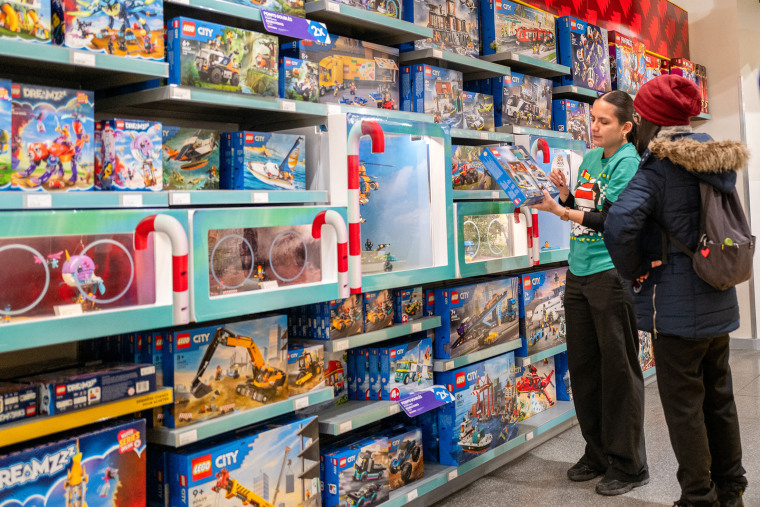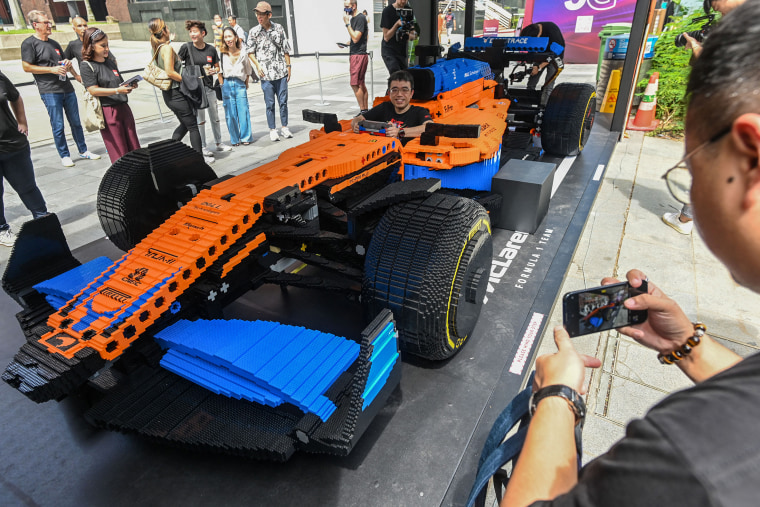Lego is reinventing its iconic brick sets and keeping the toy industry afloat
The toy industry is headed for its second consecutive annual sales decline, but it’s got one thing propping it up: colorful, interlocking plastic bricks.
At a time when toy companies are struggling to match the massive gains of pandemic-era sales, Lego is growing rapidly. The Danish company saw revenue jump 13% in the first six months of the year and continues to snap up market share.
“When you look at toy sales, Lego has just been driving all the growth in the industry this year,” said Eric Handler, managing director at Roth MKM.
After coming to the brink of bankruptcy in the early 2000s, Lego has reshaped its business and diversified its customer base, helping it to elevate sales even in inflationary market conditions.
Lego has posted positive annual revenue growth in each of the past six years.
Its strategy has involved delving into the world of licensing, catering to adults as well as kids, tapping into the digital gaming world, partnering with studios and streamers to bring Lego content to consumers and building manufacturing sites close to distribution hubs to smooth the supply chain.
Recent standouts among its tried-and-true portfolio are newly emphasized “passion points,” kits that appeal to a wide variety of consumers, from those obsessed with franchises such as Star Wars and Harry Potter to car enthusiasts and animal lovers.
“Lego has consistently bucked the trend the past few years,” said James Zahn, editor in chief of The Toy Book. “When other companies go down, Lego tends to go up.”
Zahn noted that Lego’s ability to be “ahead of the curve” has allowed it to be more nimble during times of inflation, as consumers tighten their purse strings, and to navigate upheaval in the theatrical entertainment industry and even looming tariff increases.
“I think, perhaps, the overarching story here is that they really are, it seems, like they’re two to three steps ahead of everybody else,” Zahn said.
License for fun
From miniature models of Emerald City from “Wicked” to a version of Wednesday and Enid’s dorm room in the Jenna Ortega-led “Wednesday,” Lego has tapped into pop culture to bring fan-favorite stories to life in brick form.
Licensing has long been an important strategy for toy companies. Pulling from existing and upcoming intellectual property from movies and television shows allows brands such as Lego to cater to an already robust and engaged consumer.

Lego’s first licensed partnership was in 1999 when it linked up with Lucasfilm to bring Star Wars sets to the public. Some of these kits were tied to the release of “Star Wars: Episode I — The Phantom Menace,” while others celebrated vehicles and characters from the original trilogy of films.
“Lego embraced adults, long before we started saying ‘kidults,’ and they’ve managed to continue that in new ways,” said Zahn.
Over the past two decades, Lego has worked with hundreds of other partners to translate the likes of Harry Potter, Lord of the Rings, Ghostbusters, Marvel, DC, Jurassic Park and Pixar into building blocks.
More recently, the company has launched kits such as the Sanderson sisters’ house from “Hocus Pocus” and even a “Jaws” set featuring the iconic shark taking down Quint’s boat.
“For the Lego brand, [we’ve seen] tremendous years of growth,” said Julia Goldin, chief product and marketing officer at Lego. “We made a very deliberate decision to unlock our potential with many new audiences, double down on the audiences that we already had and really ensure that we are very connected.”
Finding new brick builders
Lego isn’t stopping at franchise-based sets.
The company has worked to design different types of sets that cater to new audiences, ones that might not have otherwise bought or built a Lego set, Zahn said. This includes cityscape sets featuring skylines from London to New York, brick versions of famous paintings such as Vincent van Gogh’s “Starry Night” and Leonardo da Vinci’s “Mona Lisa” as well as a line of botanicals.
Goldin noted that Lego is “investing in bringing in new audiences to the portfolio” and creating more products for them.

That’s why Lego has partnered with Formula 1 to create a line of F1-inspired sets that range from Duplo kits for preschool children all the way to collectible sets for adults. The partnership will also span Lego’s digital platforms, and the toy company will have a presence at future F1 auto racing events.
Goldin said previous car products, including a McLaren Lego set, performed well at retail, giving Lego confidence to delve deeper into the auto racing space.
“We always start with the audience,” she explained. “We’re always looking at, what are kids into? And we saw that F1 was one of the No. 1 most growing passions among younger kids, and also growing globally and attracting a lot of new audiences, especially women and families.”
Attracting new consumers has allowed Lego to drive revenue and helped to counterbalance softness in the theatrical realm.
Much of the toy industry’s current sales woes can be attributed to the disrupted pipeline in Hollywood production. A global pandemic followed by labor strikes left Tinsel town with fewer new releases that could have served as the basis for breakout toys.
The lack of kids movies, in particular, meant toy companies were not producing as many new action figures, roleplay items and other movie tie-ins.
But in 2023, Lego offered 780 products, around 50% of which were new items, on par with recent years.
Delving into digital
At the same time, Lego has expanded beyond its retail shelf space.
The company has launched several theatrical features of its own, partnered with streamers such as Disney+ to bring Marvel and Star Wars content to the small screen and even launched its own vertical within Epic Games’ popular Fortnite game.
The expanding portfolio has kept Lego at the forefront of consumers’ minds, given them alternative ways to engage with the brand and driven incremental retail purchases.
“We have to remember that kids, they grow up,” said Goldin. “So there’s a new generation coming all the time. I think the next five years we’ll see even more digitalization and interactivity coming into the different experiences that we can create.”
Goldin said with Fortnite, the company aimed to go beyond sets and create an experience. Within the larger game of Fortnite, players can participate in a Lego-based world where they construct digital Lego buildings, battle against creatures, customize their online mini figure and socialize with other Lego fans.
Lego CEO Niels Christiansen has repeatedly touted the importance of meeting kids where they are, noting during previous earnings reports that the company is competing for children’s time and attention. Being relevant to them and in spaces that they already occupy has translated back to sales of physical Lego kits.
It is a similar strategy to the one Lego has employed in partnering with Disney+ for several Star Wars and Marvel animated shows and in its recent theatrical release of a feature-length animated documentary about Pharrell Williams called “Piece by Piece.”
[IMAGE]
“We felt [‘Piece by Piece’] really was something that was super original,” said Jill Wilfert, head of global entertainment partners and content at Lego.
“We want to attract a broader audience that’s going to be engaged with the brand,” Wilfert added. “So, this was something we thought would help us get there. And when we do entertainment for us, it’s really about doing those things that help us really convey the values of the brand in a super entertaining and relevant way, but it’s also something that families, people, friends, can experience together.”
Wilfert said Lego has several theatrical projects in development that could arrive on the big screen in the coming years.
In the meantime, the company plans to continue releasing episodes and shorts tied to existing shows that air on Netflix, Nickelodeon and YouTube.



